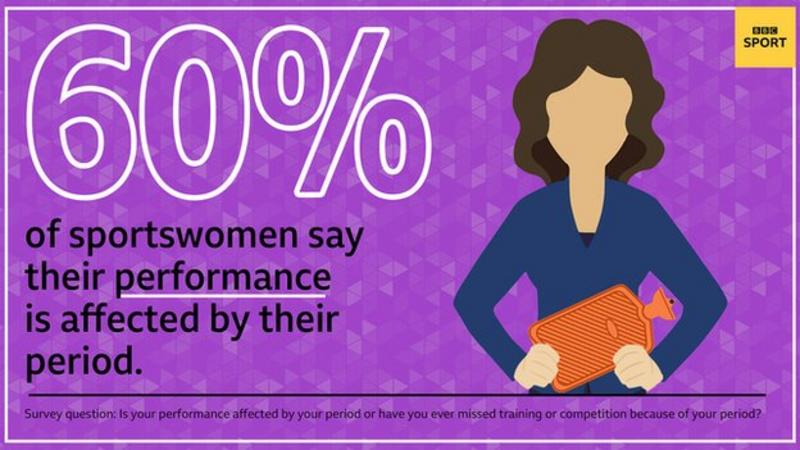Periods, the pill and the effect on female athletes (Amy Lofthouse BBC Sport)
60% of sportswomen say their performance is affected by their period
Periods must be powerful. After all, just mentioning the word can be enough to create an awkward silence in no time at all.
But while we are getting better at discussing how menstrual cycles affect our day-to-day lives, there are still too many misconceptions.
There will never be a one-size-fits-all way to deal with periods. Women’s bodies are too different, too unique, to allow for that.
But for female athletes, even the slightest change in their body can impact performance.
Some 60% of respondents in the BBC Elite British Sportswomen’s Survey said their performance had been affected by their period, and they had missed training or competitions because of it.
However, 40% said they did not feel comfortable discussing their period with coaches and a number take the contraceptive pill to control their menstrual cycle.
Full survey results here www.bbc.co.uk/sport/53593459
What are the issues? White clothing. No sanitary bins. Wearing the same tampon or pad for hours on end. Cramps. Bloating.
Most women will, at some point in their life, have come up against all of those issues, but the impact it has on athletes is still largely misunderstood.
A number of survey respondents said they took the pill to regulate their periods, because competing while menstruating became too painful or inconvenient.
But the pill brought its own problems. One athlete said her bones were made denser by the pill, another struggled to lose weight, while some said the mental effect of extra hormones in their body was too much to cope with.
Jockey Liz Kelly told BBC Sport she would sit in a sauna if she had to race on her period, because the extra two or three pounds of weight she carried from bloating would make such a difference.
“I’d have to sit in there for a couple of hours – just sitting there sweating. You are weighed on the day of the race and you can probably be sitting in the sauna until about 45 minutes before your ride if you’re really struggling,” Kelly says.
“You get out of the sauna, get dressed, do the weighing and give the saddle to the trainer. You might have time to go in and sit down but you can’t drink anything or you’d be a different weight.
“That is the everyday reality for everyone in racing. The boys find it a lot easier to sweat but they have to do it more often because they are heavier.”
Bobsleigher Isabella Burke did not like the idea of taking a pill, so she opted for the coil.
“I tried a Mirena coil but I really hated it. It had this odd suppressive effect on my mood,” she says.
“I am someone who has high highs and low lows, but this somehow just made me feel almost dead inside. I just didn’t enjoy how it felt at all and eventually had it removed.”
And then there are the practicalities of having a period.
“My sport is not well-funded almost anywhere in the world. In some places the toilets don’t even have toilet paper, let alone sanitary bins,” one athlete, who wished to remain anonymous, tells BBC Sport.
“When I was younger, doing the junior rounds, it was a huge problem. I would have to take toilet paper to every competition I went to. Often there were toilets that didn’t have locks on the doors which, if you’re trying to change a tampon, is a nightmare.
“It’s really horrifying, when you’re on your period, to be thinking: ‘Oh, am I sweating or have I leaked?’ You’re running to the toilet between contests. It’s not something you want to think about but it is in your mind.”
The athlete remembers sharing outfits with other women while competing in junior competitions because, if you get your first period, there is no hiding it when you are dressed in white.
We live in a world largely designed by men, for men. Sporting laws and stadiums are designed with men in mind, whether or not those in charge realise it.
Take cricket. The idea of women playing cricket was one so fanciful that Sir Len Hutton, one of England’s greatest batsmen, said: “Ladies playing cricket? Quite absurd. Like men trying to knit.”
“In the laws, you’re not actually allowed to leave the field to go for a wee,” Scotland’s Katie McGill says.
“In a 50-over game, you’re out there for three hours or more.
“A lot of us will double up with a tampon and a pad. It’s not great. If you get the wrong day… you’re running around a lot and then in the in-between bits, you’re standing still a lot. You have time to think about it.
“With sanitary products, a lot of cricket grounds aren’t geared up for women. A lot of us play men’s cricket to supplement our training. That’s where products become like gold dust.
“Quite often we’ll go and play and there won’t be a changing room. You’ll be using the toilet because there’s men in the changing room. Or even like a women’s game, the facilities will be set up by men. There won’t always be the correct disposal units or stuff like that.”

‘It was change my pill or give up football’ Rachel Newborough plays for Northern Ireland and Charlton Athletic
Let’s face it, heading the ball is a pretty key part of football – especially for a defender. But every time Rachel Newborough did it, she would struggle for the rest of the game.
“My vision would go blurry from the bottom to the top,” she tells BBC Sport. “You feel really disorientated and you can’t track an attacker.
“I had to come off the pitch and would have a banging headache for a couple of hours.”
As a 16-year-old, Newborough had gone on the combined pill, which contains a mixture of oestrogen and progesterone. She was also approaching a key part of her career, stepping up into the Northern Ireland Under-19 squad and increasingly competitive environments.
She had a head scan, which came back clear, but the doctors were concerned about the potential effect the pill could have when coupled with Newborough’s headaches.
“They told me they had to take me off that pill because the headaches I was having highly increase your chances of having a stroke,” she says.
“The advice from the private doctor was to take a supplementary pill once a day, or stop heading the ball. I thought: ‘I’m a defender I can’t not head a ball.'”
The other option suggested by the doctor was to stop playing football; essentially, give up the chance of representing your country.
Newborough opted to take a progesterone-only pill, but it took two and a half years for the headaches to subside.
“Two of my good friends have stopped playing football this year because of head injuries. The doctors have said they can’t keep playing. They had similar episodes to what I was having,” she adds.
“Is the awareness there that if you’re having those headaches when you head the football, then you shouldn’t be on this type of pill because it’s dangerous? I don’t think that is a known thing.”
What does the science say?
Scientifically speaking, the effect of a pill on an athlete’s performance is negligible – but that will never be a one-size-fits-all rule.
The most common pill usage is to take it for 21 days, and then have seven pill-free days. During those, the body will typically undergo a withdrawal bleed, which is a reaction to a sudden drop in hormones.
“The bleed athletes have while on the pill is not a period – it is caused by withdrawing the exogenous hormones,” says Dr Anita Biswas, the co-lead for female athlete health and performance at the English Institute of Sport.
Some women may retain fluid on the pill, or find that the change in hormones impacts their appetite.
“Whether weight gain affects an athlete will depend on their sport. Usually weight gain, if present, only occurs initially and doesn’t continue, provided the athlete is aware of this and able to monitor and manage what they are eating,” Biswas adds.
Dr Kirsty Elliott-Sale, who looked into the impact of the pill on performance for Nottingham Trent University, said women should be comfortable discussing what they are putting into their bodies.
“It’s a very individual response and we should look at it on an individual basis. It may take some trial and error; it may take some different pills,” she adds.
“It’s important to invest some time and a little bit of research into which is the best one for you.”
How do athletes talk about it?
Is it that time of the month again? – Hockey players talk periods
Survey respondents who said they would not feel comfortable discussing their period with their coaches had similar stories.
Their coaches are middle-aged men; they are scared their period problems would be used against them in selection; they didn’t want to be seen as finding an excuse for underperforming.
One athlete recalled a male coach telling her to “man up and pull your tampon out” during a training session.
If you had a sore ankle, for example, you’d tell your coach about that. So why not your period?
“Athletes are very keen to talk about how they sleep, what they eat, how they train, what sports kit they’re wearing,” Elliot-Sale adds.
“And yet for such a long time we’ve not really considered or spoken about menstrual cycles or hormonal contraceptive use.
“It’s been pushed back and I think the tide has turned. There is certainly more of an appetite now for this type of research to be implemented into elite sport.”
If we talk about it, they have to listen. So let’s talk.
Periods and the pill are two of many issues raised by the BBC Elite British Sportswomen’s Survey. BBC Sport will be shining a spotlight on the others with coverage throughout the week on the BBC Sport website, BBC Radio 5 Live and BBC TV. More information can be found here.

